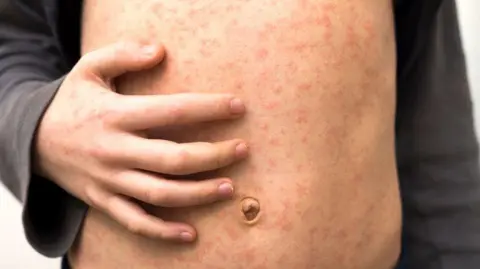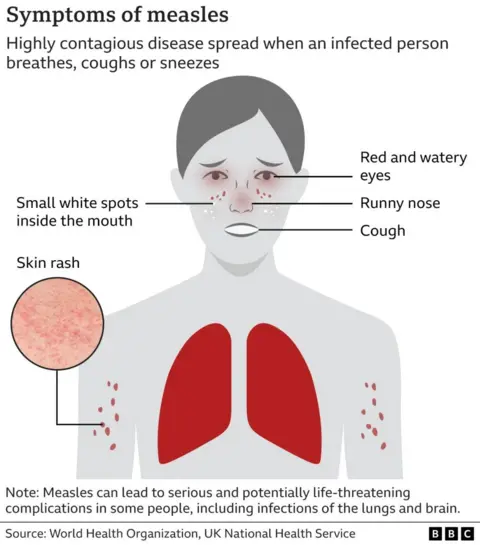Measles holiday warning as cases rise in Europe
 Getty Images
Getty ImagesFamilies travelling abroad this summer on holiday or to visit relatives are being warned about the rise in measles cases in Europe and other regions.
Measles infections in Europe are at a 25-year high, while cases are also surging in countries such as Pakistan and Nigeria.
Childhood vaccination rates in the UK that offer protection against measles, mumps and rubella (MMR) are still a long way below the recommended 95% uptake, with the lowest regional rates found in London at just over 73% vaccinated.
The UK Health Security Agency is warning holidaymakers to make sure they are up to date with their vaccinations and stress that it is never too late to get vaccinated.
The UKHSA's latest data on measles infections shows that an outbreak is continuing in England.
Some 109 cases were confirmed in April and 86 so far in May. These cases have mostly been in unvaccinated children aged 10 years and under.
London has reported almost half of all cases in the past four weeks.
Dr Vanessa Saliba, consultant epidemiologist at the UK Health Security Agency, says the rise in cases in England reflects what is happening abroad - and that's a concern as the summer holiday season gets going.
"It's essential that everyone, particularly parents of young children, check all family members are up to date with two MMR doses, especially if you are travelling this summer for holidays or visiting family," Dr Saliba said.
"Measles cases are picking up again in England and outbreaks are happening in Europe and many countries with close links to the UK."
Measles spreads very easily and can be a nasty disease, leading to complications like ear and chest infections and inflammation of the brain with some children tragically ending up in hospital and suffering life-long consequences, Dr Saliba added.
"Nobody wants this for their child and it's not something you want to experience when away on holiday."
European cases hit a 25-year high
The decline in vaccination rates in the UK - particularly since the Covid pandemic - has been mirrored in other countries, especially in Europe.
The World Health Organization and UNICEF reported 127,350 measles cases in the European Region in 2024 - double the number of cases reported during the previous year and the highest number since 1997.
This year has seen outbreaks in several other European countries popular with UK holidaymakers, including France, Italy, Spain and Germany.
The WHO has also reported that Romania, Pakistan, India, Thailand, Indonesia and Nigeria currently have among the largest number of measles cases worldwide.
Never too late
There has been a big push to improve MMR vaccination rates across the UK, but Dr Amanda Doyle, national director for primary care and community services at NHS England, says there is still a lot of work to do.
"Too many babies and young children are still not protected against the diseases, which are contagious infections that spread very easily and can cause serious health problems.
"MMR jabs are provided free as part of the NHS routine immunisation programme – and I would encourage all parents to act on invites or check vaccination records if they think they may have missed their child's vaccination."
Health experts say that anyone, whatever their age, who has not had two doses of the MMR vaccine can contact their GP surgery to book an appointment and that it is never too late to catch up.
What is measles and what are the symptoms?

Measles is a highly contagious disease which is spread by coughs and sneezes.
Common symptoms include:
- high fever
- sore, red and watery eyes
- runny nose
- coughing
- sneezing
Small white spots may appear inside the mouth.
A blotchy red or brown rash usually appears after a few days, typically on the face and behind the ears, before spreading to the rest of the body.
It can be harder to see on brown and black skin.
Measles normally clears up within seven to 10 days. However, it can lead to pneumonia, meningitis, blindness and seizures.
Babies and young children, pregnant women and those with a weakened immune system are at increased risk. Getting it while pregnant can lead to stillbirth, miscarriage or babies being born small.
Measles can be fatal, but this is rare.
